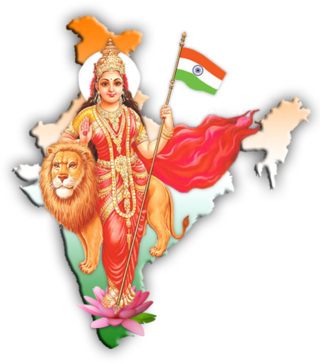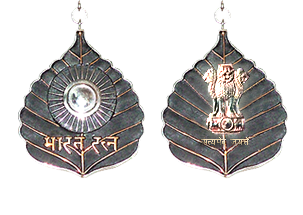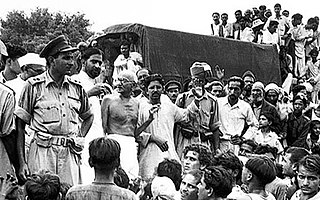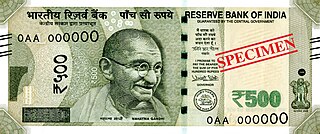
Jawaharlal Nehru was an Indian anti-colonial nationalist, statesman, secular humanist, social democrat, and author who was a central figure in India during the middle of the 20th century. Nehru was a principal leader of the Indian nationalist movement in the 1930s and 1940s. Upon India's independence in 1947, he served as the country's first prime minister for 16 years. Nehru promoted parliamentary democracy, secularism, and science and technology during the 1950s, powerfully influencing India's arc as a modern nation. In international affairs, he steered India clear of the two blocs of the Cold War. A well-regarded author, his books written in prison, such as Letters from a Father to His Daughter (1929), An Autobiography (1936) and The Discovery of India (1946), have been read around the world. The honorific Pandit has been commonly applied before his name.

Mohandas Karamchand Gandhi was an Indian lawyer, anti-colonial nationalist and political ethicist who employed nonviolent resistance to lead the successful campaign for India's independence from British rule. He inspired movements for civil rights and freedom across the world. The honorific Mahātmā, first applied to him in South Africa in 1914, is now used throughout the world.

Bharat Mata is a national personification of India (Bharat) as a mother goddess. Bharat Mata is commonly depicted dressed in a red or saffron-coloured sari and holding a national flag; she sometimes stands on a lotus and is accompanied by a lion.

The Bharat Ratna is the highest civilian award of the Republic of India. Instituted on 2 January 1954, the award is conferred in recognition of "exceptional service/performance of the highest order", without distinction of race, occupation, position, or sex. The award was originally limited to achievements in the arts, literature, science, and public services, but the government expanded the criteria to include "any field of human endeavour" in December 2011. The recommendations for the Bharat Ratna are made by the Prime Minister to the President, with a maximum of three nominees being awarded per year. The recipients receive a Sanad (certificate) signed by the President and a peepal leaf-shaped medallion. There is no monetary grant associated with the award. Bharat Ratna recipients rank seventh in the Indian order of precedence.

The Salt March, also known as the Salt Satyagraha, Dandi March, and the Dandi Satyagraha, was an act of nonviolent civil disobedience in colonial India, led by Mahatma Gandhi. The twenty-four day march lasted from 12th March to 5th April 1930 as a direct action campaign of tax resistance and nonviolent protest against the British salt monopoly. Another reason for this march was that the Civil Disobedience Movement needed a strong inauguration that would inspire more people to follow Gandhi's example. Gandhi started this march with 78 of his trusted volunteers. The march spanned 387 kilometres (240 mi), from Sabarmati Ashram to Dandi, which was called Navsari at that time. Growing numbers of Indians joined them along the way. When Gandhi broke the British Raj salt laws at 8:30 am on 6 April 1930, it sparked large-scale acts of civil disobedience against the salt laws by millions of Indians.

Independence Day is celebrated annually on 15 August as a public holiday in India commemorating the nation's independence from the United Kingdom on 15 August 1947, the day when the provisions of the Indian Independence Act, which transferred legislative sovereignty to the Indian Constituent Assembly, came into effect. India retained King George VI as head of state until its transition to a republic, when the Constitution of India came into effect on 26 January 1950 and replaced the dominion prefix, Dominion of India, with the enactment of the sovereign law Constitution of India. India attained independence following the independence movement noted for largely non-violent resistance and civil disobedience led by Indian National Congress under the leadership of Mahatma Gandhi.

Gandhism is a body of ideas that describes the inspiration, vision, and the life work of Mohandas K. Gandhi. It is particularly associated with his contributions to the idea of nonviolent resistance, sometimes also called civil resistance.

The Champaran Satyagraha of 1917 was the first satyagraha movement led by Mahatma Gandhi in British India and is considered a historically important rebellion in the Indian independence movement. It was a farmer's uprising that took place in Champaran district of Bihar in the Indian subcontinent, during the British colonial period. The farmers were protesting against having to grow indigo with barely any payment for it.
Pravasi Bharatiya Divas is a celebratory day observed on 9 January by the Republic of India to mark the contribution of the Overseas Indian community towards the development of India. The day commemorates the return of Mahatma Gandhi from South Africa to Mumbai on 9 January 1915.
"Raghupati Raghava Raja Ram" is a bhajan widely popularised by Mahatma Gandhi and set to tune by Vishnu Digambar Paluskar in Raga Mishra Gara.

International Day of Non-Violence is observed on 2 October, the birthday of Mahatma Gandhi. It was established on 15 June 2007 according to United Nations General Assembly resolution A/RES/61/271. The day is an occasion to "disseminate the message of non-violence...through education and public awareness...and reaffirm the desire for a culture of peace, tolerance, understanding and non-violence". It is not a public holiday, but is observed around the world in various ways, often to draw attention to global issues. Its date and purpose correspond with those of the Indian national public holiday of Gandhi Jayanti.
Mahatma Gandhi College is a college in Thiruvananthapuram, Kerala, India. It was founded by to Mannathu Padmanabhan, the founder of the Nair Service Society. The college is affiliated to Kerala University and is managed by Nair Service Society. The pioneer institution in Thiruvananthapuram having "College with potential for excellence" awarded by NAAC. As per the 2019 NIRF rankings, Mahatma Gandhi College stands at 68th rank in India and fourth rank in Thiruvananthapuram.

Ambedkar Jayanti or Bhim Jayanti is observed on 14 April to commemorate the memory of B. R. Ambedkar, Indian politician and social reformer. It marks Ambedkar's birthday who was born on 14 April 1891. His birthday is also referred to as 'Equality Day' by some in India.

The Indian 500-rupee banknote is a denomination of the Indian rupee. In 1987, the ₹500 note was introduced, followed by the ₹1,000 note in the year. The current ₹500 banknote, in circulation since 10 November 2016, is a part of the Mahatma Gandhi New Series. The previous banknotes of the Mahatma Gandhi Series, in circulation between October 1997 and November 2016, were demonetised on November 8, 2016.

Gyarah Murti is a monument located in New Delhi, India, commemorating the country's struggle for independence under the leadership of Mahatma Gandhi. Devi Prasad Roy Choudhury is credited as its sculptor. An ensemble of eleven statues, ten represent people from diverse sociocultural, religious and economic backgrounds following Gandhi in the lead. Widely believed to depict the Dandi March, the statue has been replicated in other cities in India and was featured on the old 500-rupee currency note.
The Ahimsa Award is an annual award given by the Institute of Jainology in recognition of individuals who embody and promote the principles of ahimsa (nonviolence). It was established in 2006 and has since been awarded at the annual Ahimsa Day event, on 2 October, the birth anniversary of Mahatma Gandhi.

S. P. Varma is a social worker and peace activist from Jammu and Kashmir. He has been actively involved in peace-building efforts in conflict-ridden areas of the Kashmir valley.

Swachh Bharat Mission, Swachh Bharat Abhiyan, or Clean India Mission is a country-wide campaign initiated by the Government of India on 2 October 2014 to eliminate open defecation and improve solid waste management and to create Open Defecation Free (ODF) villages. The program also aims to increase awareness of menstrual health management. It is a restructured version of the Nirmal Bharat Abhiyan which was launched by Congress in 2009 that failed to achieve its intended targets due to rampant corruption and indecisive leadership.

Parameswaran Iyer is an Indian civil servant and the former CEO of NITI Aayog. He is currently serving as India's nominee as an Executive director in World Bank.















